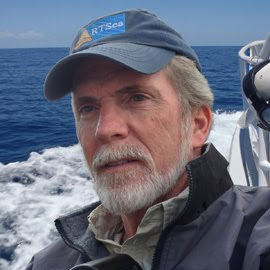 The Bahamas is known within the shark diving community as one of the top locations for seeing sharks. Tiger sharks, lemon sharks, and Caribbean reef sharks are three of the more common species, along with occasional bull, hammerhead, and nurse sharks. From Stuart Cove's Nassau shark diving operation to the boats that frequent popular Tiger Beach off Grand Bahamas, shark diving has flourished as a tourist activity in relatively shallow water.
The Bahamas is known within the shark diving community as one of the top locations for seeing sharks. Tiger sharks, lemon sharks, and Caribbean reef sharks are three of the more common species, along with occasional bull, hammerhead, and nurse sharks. From Stuart Cove's Nassau shark diving operation to the boats that frequent popular Tiger Beach off Grand Bahamas, shark diving has flourished as a tourist activity in relatively shallow water.But cruising in deep waters is another entire world of sharks, one that has largely remained out of sight from divers and scientists alike. There is much that we do not know about sharks, but with these deep water denizens we know even less. Over half of the documented species of sharks live below 200m (660 ft.) but only a handful have been studied to any appreciable degree.
To help fill that void in knowledge, researchers at the Cape Eleuthera Institute, along with scientists from Florida State and Stony Brooks Universities, are conducting research on several deep water sharks as part of the institute's Shark Conservation and Research Program. Utilizing
 satellite tags supplied by Microwave Telemetry, Inc. (including a new, next-generation of micro-tags more suitable for smaller sharks), the researchers have been quite successful in capturing and tagging 25 sharks from six different species, ranging from a 13-foot bluntnose sixgill shark to a petite sawtail catshark at 18 inches.
satellite tags supplied by Microwave Telemetry, Inc. (including a new, next-generation of micro-tags more suitable for smaller sharks), the researchers have been quite successful in capturing and tagging 25 sharks from six different species, ranging from a 13-foot bluntnose sixgill shark to a petite sawtail catshark at 18 inches.According to The Bahamas Weekly.com, Dr. Dean Grubbs of Florida State University was more than pleased. "I have conducted research on deep water sharks in a number of locations around the world including the central Pacific off Hawaii, the temperate western Atlantic off the east coast of the USA and in the Gulf of Mexico. Cape Eleuthera appeared to be an ideal location to expand my research however I never expected the incredible diversity and abundance of species we encountered these last few days. Twenty-five sharks from six different species on only six surveys is an incredible record." said Dr. Grubbs.
Realizing the impact of commercial shark fishing on these important predators and scavengers, in addition to appreciating their role as a component of the islands' tourist economy, the Bahamian government has been proactive in shark conservation, which includes a longline fishing ban in the 1990s, and enthusiastically supports the research taking place involving these deep water species.
"The absence of a commercial fishery of any significance for sharks in The Bahamas, along with a wide variety of marine habitats within close proximity to the facility makes the Cape Eleuthera Institute an ideal location for the pursuit of research into these important species," said the Department of Marine Resources director, Michael Braynen.
Best of success to the Cape Eleuthera Institute. The more light that can be shed on all members of the shark family, the better we will understand how they are woven into the fabric of the ocean ecosystem - not only as pelagic apex predators but as ocean citizens of a mysterious deep water community.
Read the article in The Bahamas Weekly.com.

















No comments:
Post a Comment